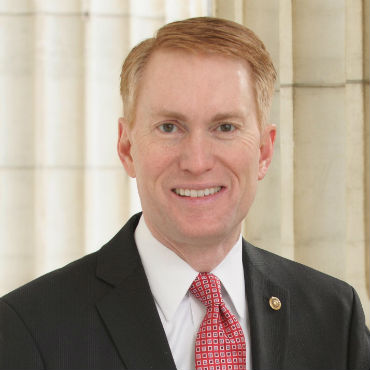Lankford looks to cut debate time for political nominations
With hundreds of key vacancies throughout the government, one GOP senator is looking to cut debate time for nominees requiring Senate approval.

Sen. James Lankford wants to revise Senate roles to speed conformation of President Trump's nominees.
With hundreds of key vacancies persisting throughout the government, one senator is looking to cut debate time for presidential nominees requiring Senate approval to speed up the confirmation process.
Sen. James Lankford (R-Okla.) introduced a proposal that would limit the debate time to eight hours after a cloture is invoked for most Senate-confirmed appointments. For district judges, the proposal would limit post-cloture debate to two hours. Under current rules, 30 hours of post-cloture debate time is allowed.
"I can see obviously what everyone else can see: it's not working, and it hasn't been," Lankford said at a Dec. 19 Senate Rules and Administration hearing. "This has real-world consequences the more that this slows down the process... We can either do nominations or legislation, but the Senate cannot walk and chew gum at the same time. We can only do one thing at a time."
The measure would restore the temporary rules of the 113th Congress, which were passed by a 78 to 16 margin. The difference between now and then, however, is that at the time, invoking cloture to proceed to a vote on Senate confirmations required 60 votes. Now cloture on nominations is accomplished by a majority vote.
Committee Democrats raised concerns that, without the protection of the 60-vote threshold, the measure would unfairly benefit the majority party.
"The current Congress is on track for a record-breaking year of advancing judicial nominees, and it is unnecessary at this moment to change the rules of the Senate," said Ranking Member Amy Klobuchar (D-Minn.).
The protracted Senate process to confirm presidential nominations has compounded the Trump administration's historic slowness in staffing the government — a trend that has worsened over the last three administrations.
As of Dec. 14, the average time for the Senate to confirm presidential nominations has steadily climbed — from 36 days under George W. Bush to 51 days under Barack Obama and 71 days under Donald Trump, according to the Partnership for Public Service's appointments tracker.
Lankford also pointed out that while the Senate has been slow to confirm Trump's nominations, "the White House owes us a lot more people to be able to put through the nomination process."
"But even if they got here," he added, "we're not moving them at the pace they actually need to be moved."
Bush and Obama each had over 400 nominations confirmed by Dec. 14 of their first years in office; Trump has had 259. However, Trump has a backlog of 212 appointees that have been appointed, but still await confirmation. By comparison, Obama had 194, and Bush had 114.





